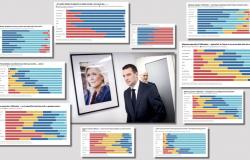“Don’t be afraid, you will hear about sport on France Inter…”. Thus amused the hoarse voice of producer Philippe Collin, host of the first weekly show devoted to sport (The eye of the tiger, from 2016 to 2021) on the most listened to radio station in France. Internally, it’s a culture shock. In the middle of literature, cinema and philosophy programs, placing programs on this vulgar free-for-all that is sport, what an idea!
Exaggerated? Not really, according to Béatrice Barbusse, sports sociologist and former manager of Ivry Handball: “France, culturally, is not a sporting country. Sport has often been considered a secondary subject of writing, something that is not serious. Worse, with regard to athletes, we note a fairly generalized form of social contempt. » We remember the Information puppets, on Canal+, which caricatured a good number of athletes as service idiots (Jean-Pierre Papin, Frank Ribéry, Richard Virenque, etc.).
The researcher also regrets too little historical culture on sport. “During my studies, I was never told about sport or important sporting events, even in history or French. For example, no one in France learns who Jules Ladoumègue was, even though this athlete brought together more than a million people on the Champs-Élysées in the 1930s. And it’s even worse for sportswomen. Who in France knows Alice Milliat, a pioneer behind the first women’s Olympic Games? »
If politicians have gradually understood the benefit of appearing alongside victorious athletes, they have long neglected the importance of sport. In 1995, the handball players, led by a genius of the game, Jackson Richardson, brought France its first world title in team sport. But during the reception at the Élysée, the President of the Republic, Jacques Chirac, did not recognize him and even addressed the Reunionese… in English!
Three years later, he was also caught red-handed, during the 98 World Cup final against Brazil, for not knowing the players when their names were announced by the announcer.
Responsibility of the education system
“ The French system seems to carry out a form of hierarchy between intellectual culture and bodily culture, a Cartesian dualism between the body and the mind. agrees Guillaume Dietsch, researcher in public sports policies. “For example, PE remains the only subject in which a student can be exempted from lessons, which is unthinkable for maths or French. It’s part of the representations, the lack of consideration for these disciplines. »
Relegation is unthinkable in countries like the United Kingdom or the United States, for example, where sport is an integral part of student culture and elite training. There Boat Race, which pits Oxford and Cambridge students against each other in rowing in front of hundreds of thousands of spectators, or the March Madnessthe final stages of the American university basketball championship, followed by more than ten million viewers, have no equivalent in France.
“ In the United States or Australia, sport is omnipresent, including in the urban landscapeagrees Béatrice Barbusse. You can’t walk a day across the country without seeing people playing sports, equipment and classes in public. »
Confronting feelings and reality
What if this is what explains the discomfort of French athletes, who have made numerous declarations in recent months about the lack of sporting culture in their country? “I will make enemies, but we are not at all a sports country”, declared for example the swimmer Florent Manaudou on France 2, last November, soon followed by the sprinter Christine Arron and the judoka Teddy Riner.
Culture
Set of norms and values that are shared by individuals who are members of the same social entity.
To support their words, they cite the low number of hours of PE lessons, the lack of infrastructure for the very high level, which sometimes pushes promising talents into exile and, finally, insufficient support of the State within the framework of the next Olympic Games… This feeling seems to be quite widely shared: “ I’m super happy because 99% of Para and Olympic athletes supported me and shared my TV appearance in their stories Instagram“, added the swimmer.
Does this feeling correspond to reality? Many numerical indicators seem to answer “no”. France is, for example, one of the countries in Europe providing the most hours of PE, from primary to secondary school, far ahead of Italy, Germany and Spain, even if the actual practice time sports is often reduced by the distance between establishments and facilities and the drop to two hours in high school, when many adolescents drop out of sport, makes experts cringe.
As for the very high level, France is, for example, in fifth place among the nations with the most medals at the Olympic Games. Compared to its total population, it has a very high ratio in terms of sporting results and medals at international level.
In 2023, France was even ranked second in the world for the largest sporting nations by the British site GreatestSportingNation.com, which compiles the results of 80 sports, with coefficients giving more importance to team sports and popular sports (depending on the number of participating countries). According to the site, France stands out for its versatility and success in team ball sports: final of the 2022 Football World Cup, winner of the Six Nations Tournament in 2022 in rugby, gold medals at the last Tokyo Games in men’s and women’s handball…
In the beginning was de Gaulle
It has not always been the case. In 1960, the French delegation left the Rome Olympics without a single gold medal. For General de Gaulle, who has just returned to power and made the greatness of France a major axis of his political philosophy, this is unacceptable. “During the Maurice Herzog years [secrétaire d’État à la Jeunesse et aux Sports de 1958 à 1965, NDLR]France has set up a state structure for Olympic preparation to enable it to shine throughout the world through its victories, says sports historian Patrick Clastres, in The world. What is specific to France is that the high level has been taken care of by the State, unlike liberal Anglo-Saxon countries, where the performance production structures are either those of professional sport, or those of universities. This generates in our country a form of elite sport schizophrenia: it would like to be independent of the State in order to be able to conduct very high-level policy, which it thinks is the best, but it would not understand no longer be subsidized. »
In October 1965, for example, de Gaulle inaugurated the Halle Maigrot, at the time the largest indoor hall in Europe, located in the center of what would become the National Institute of Sport, Expertise and Performance (Insep ). But its sports policy will go well beyond sports equipment intended for high-level athletes.
“It is this doctrine which still forms the basis of the French pyramid system of federations today, with this idea of democratizing sporting practice and increasing the number of practitioners to ultimately to identify an elite, analyzes Guillaume Dietsch. France’s sports policy will thus be characterized by a policy of equality, of access to the greatest number, where the sports association fabric extends to the entire territory, unlike Anglo-Saxon countries, where inequalities are quite strong, with a significant cost of sports practice.»
France has 311,000 sports facilities and regularly implements public policies to support the practice, such as the Pass’Sport, aid of 50 euros to register in a club intended for audiences furthest from sport. Result of this proactive public policy: France has never been so sporty, even if it remains, for example, very far from the mobilization across the Rhine: Germany has 22 million licensees in 2022, compared to nine million in France, i.e. half as much, compared to the population.
Despite everything, more than 30 million French people say they practice a sporting activity at least once a week. Another sign of enthusiasm, 700,000 French people go to the stadium every weekend to support their favorite team.
Young people run slower
This model nevertheless faces a major problem: young people dropping out of school. “ Younger generations are doing less and less sport. This has been detectable for five to ten years. Among 14-20 year olds, there is a very strong decline, they are caught up in social networks and video games to the detriment of sports, which can lead to obesity. In terms of public health, this dropout is very worrying “, worries Patrick Clastres.
The figures speak for themselves: in 50 years, the average physical capacity of 7-18 year olds has fallen by 25%, according to a recent study carried out by Professor Carré, sports cardiologist at Rennes University Hospital. In 1971, a middle school student ran 600 meters in three minutes, in 2022, it takes four.
“The French model of sports associations centered on sports competition no longer seems to meet the aspirations of the youngest today, confirms Guillaume Dietsch. Above all, they aspire to practice physical and sporting activity for reasons of health, pleasure and conviviality. Today, in surveys, pure competition only comes in eighth place among the announced priorities, girls and boys combined. Since the beginning of the 21st centurye century, they prefer multi-practice and sports zapping. » Less quest for medals, more collective pleasure… What if these were the sporting values of tomorrow?

Overseas territories, breeding grounds for champions too long forgotten
Marie-José Perec, Laura Flessel, Teddy Riner, Christine Arron, Jackson Richardon, Dimitri Payet, Roger Bambuck… What would the history of high-level French sport be without its ultra-marine athletes? Yet the metropolis has abandoned them for too long.
“ These are territories which suffer from under-structuring in terms of sports facilities, says Béatrice Barbusse, sports sociologist. I have the feeling that they have been a little forgotten for years but, and even if it depends on the federations, it is changing. For example, in handball, we have just opened a training center in Mayotte, where 70% of the licensees are women and we are helping these areas a lot to structure themselves. This is not done without resistance: in recent years, we have organized two general assemblies in Martinique and Reunion, and some have criticized us. Yes it costs more to travel there, but they are part of France! »








